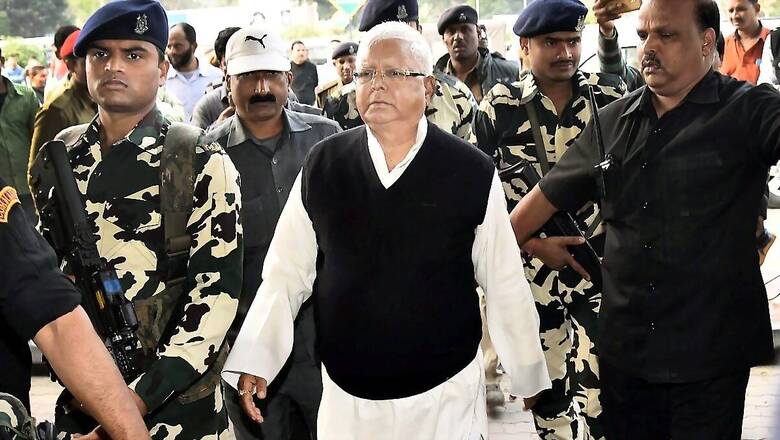
views
In a recent seminar that I attended, a speaker mouthed off a familiar homily: the torrid regime of Lalu Prasad Yadav was merely an expression of the “bad behaviour” of a class of people who had been oppressed for centuries. It rekindled a rush of memories – both personal and public – of the national climate prevailing in the tumultuous 1990s.
Bihar was the poster state of that decade of all-encompassing horror and Lalu was its poster boy. In practical terms, his dusty road to power and his consequent “success” was gravelled by the legacy AIM complex – academia, intelligentsia and media. In the aftermath of the 2015 Assembly elections, the nation witnessed a cheerleading parade of prominent English media journalists who openly celebrated Lalu Yadav’s impressive comeback – this when he was not even a pale shadow of his former glory.
Just two years later in 2017, a shocking news expose in the form of audio tapes revealed that Lalu Yadav was taking orders from his trusted decadal aide, the notorious mafia don-turned-politician, Mohammad Shahabuddin. Shahabuddin died in 2021 but his grim record continues to outlast him. It is a putrid study in the theory and practice of political criminalisation.
In the 1990s, almost no day began without the nation being revolted by the ghastly headlines emanating from Bihar. The undeniable patron saint of this full-blown criminalisation of politics was Lalu Prasad Yadav, the then Chief Minister of Bihar, ably assisted by the self-same Mohammad Shahabuddin.
Journalist Sankarshan Thakur’s book, ‘The Making of Laloo Yadav: The Unmaking of Bihar’ is perhaps the most definitive work on both the era and the man, Lalu.
Asks Thakur, “What do we say of Bihar? What do we say of a state itself so punched and blown it is not even supposed to feel pain? What do we say of a state so inured to wretchedness it refuses now to convey it or complain? … Yeh Bihar hai. Yahan sub kuch chalta hai.”
Instead of despairing and being appalled at how Lalu’s brand of politics razed Bihar on a daily basis, the aforementioned AIM complex actually celebrated it as some sort of a “victory of the oppressed classes” while arguing for a classless society in the same breath.
A minuscule of people in the millennial generation are even aware of the infamous Lalu jokes that were wildly popular in the 1990s. How Lalu would solve the Kashmir problem by giving Bihar free of cost to Pakistan, or how he once told Japan’s Prime Minister that he would convert Japan into another Bihar in just three months or how Bihar’s roads were as smooth as Hema Malini’s cheeks. That an ongoing crime saga of epic proportions and a colossal tragedy had been reduced to this sort of humour is a travesty that defies definition. It was casual cruelty. The whole nation revelled in these jokes.
Likewise, veteran journalist Prem Shankar Jha noted in India Today, that in the 2000 Bihar Assembly polls, Lalu stunned everyone by trouncing the combined might of the Opposition comprising the BJP-JD(U)-Samata Party.
When the usual allegations of booth capturing are accounted for, one fact stands out. Misrule, corruption, fraud, betrayal of promises no longer matter to Bihar’s people… according to a Bihar State Intelligence Bureau report, suppressed in 1997 by Governor A.R. Kidwai and Prime Minister I.K. Gujral, Laloo was the patron saint of a third of the 120 or so dacoit gangs active in the state. (Emphasis added).
It’s not an exaggeration to say that Lalu Yadav holds the singular distinction of being an elected representative who mocked, derided and destroyed democracy with impunity on such an extensive scale for so long. The phrases “kidnapping as economic development” and “Jungle Raj” applied to his regime connote precisely this. The law of the jungle, while it appears heartless, is actually just. In its own way, it guarantees the survival of every species and balances creation. Lalu’s Jungle Raj was the rule of the all-devouring ogre.
Another notorious face of his Jungle Raj was the meteoric emergence of Mohammad Shahabuddin whose savage criminal history needs a thorough revisiting. Shahabuddin catapulted himself into the national limelight in the outrageous gunfight that he and his private militia had with the police on March 16, 2001. The PUCL fact-finding and eyewitness bulletin of October 2001 on the incident makes for a spine-chilling read and observes how Shahabuddin is a history-sheeter with a 16-year-long record of crimes, which include murder, attempt to murder, kidnapping, possession of illegal arms and explosives and a number of other crimes. In the police dossier maintained by Hussain Ganj police station, his name figures under Class A.
The patronage and de facto immunity from legal action offered to him by the RJD government gradually made him a law unto himself and gave him an aura of invincibility…the police…turned a blind eye to his criminal activities and allowed him to turn Siwan district into his fiefdom where his fiat ran… Shahabuddin’s reign of terror has been so complete that nobody dared depose against him in cases in which he was an accused. His sway was made complete by posting servile officers willing to act as his stooge.
As Rajya Sabha MP, Arun Shourie in 1999 reproduced intelligence reports on Shahabuddin, which leave nothing in doubt: [Shahabuddin is] a Mafia don having an estimated strength of 100 armed followers. He virtually runs a parallel administration in the district…Equipped with automatic and semi-automatic weapons like AK series rifles (15), carbines (20), pistols/revolvers (160), Mausers (5), and hand grenades (80), the gang of…. operates in Siwan and its adjoining districts. The gang is responsible for political killings, collecting ransom from kidnapping rich traders/industrialists, extorting money from…contractors, smuggling of arms, synthetic drugs, etc. The gang is reported to have relations with the Daud Ibrahim gang presently based at Dubai… (Emphasis added).
The extent of Shahabuddin’s macabre criminality can also be gauged in the grotesque case where he and his henchmen drenched Girish and Satish Raj in acid before shooting them dead. Also well-known is the story of how he contested the 2004 MP elections from jail and emerged victorious. Shahabuddin’s infamy found a place in Bollywood in Prakash Jha’s Apharan. In the movie, Nana Patekar’s character, Tabrez Alam, the mafia don, kidnapper, gunrunner and extortionist MLA and minister eerily resembles him.
Ultimately, a sense of history tells us that Mohammad Shahabuddin is the untameable Frankenstein’s monster created not by Lalu Yadav but by the spurious brand of secularism concocted and practiced by the Congress for decades. And so, if Lalu took orders from Shahabuddin, the roots of this malaise must be traced back to Congress secularism.
One can detect parallels in another phenomenon. For more than two decades, the so-called Shahi Imams of Delhi’s Juma Masjid had held sway over at least two Congress prime ministers, both belonging to Nehru’s stock.
We can close this by recalling a significant episode from the 1990s that best illustrates how the Lalu government had openly made a travesty of the Indian Parliament. In 1998, the then President K.R. Narayanan returned a Union government resolution recommending the imposition of President’s rule in Bihar following unimpeachable evidence of a complete breakdown of governance and law and order. Five months later, the Central government passed the same resolution. The President acceded it again. The state government was removed. However, the resolution was not ratified by one House of Parliament where the government didn’t have the numbers. But those who did have the numbers stood solidly behind Lalu Yadav.
Their reasoning was supplied by CPI leader, Harkishen Singh Surjeet, who declared, “We have decided to put all our differences on the backburner… The top priority is to oppose and overthrow the BJP-led government.” What was left unsaid: it doesn’t matter that there’s Jungle Raj in Bihar. That’s how Lalu Prasad Yadav was saved by secularism.
This partial dossier only reinforces the point about the scary threat that Lalu’s brand of politics continues to pose for Indian democracy. The political scenario has vastly changed from the 1990s and while Lalu’s power has concomitantly diminished, it has not fully gone away. It is an opportunity waiting for revival.
And even as we speak, Lalu Yadav, convicted for life, miraculously remains a free man.
The author is the founder and chief editor, The Dharma Dispatch. Views expressed in the above piece are personal and solely that of the author. They do not necessarily reflect News18’s views.




















Comments
0 comment